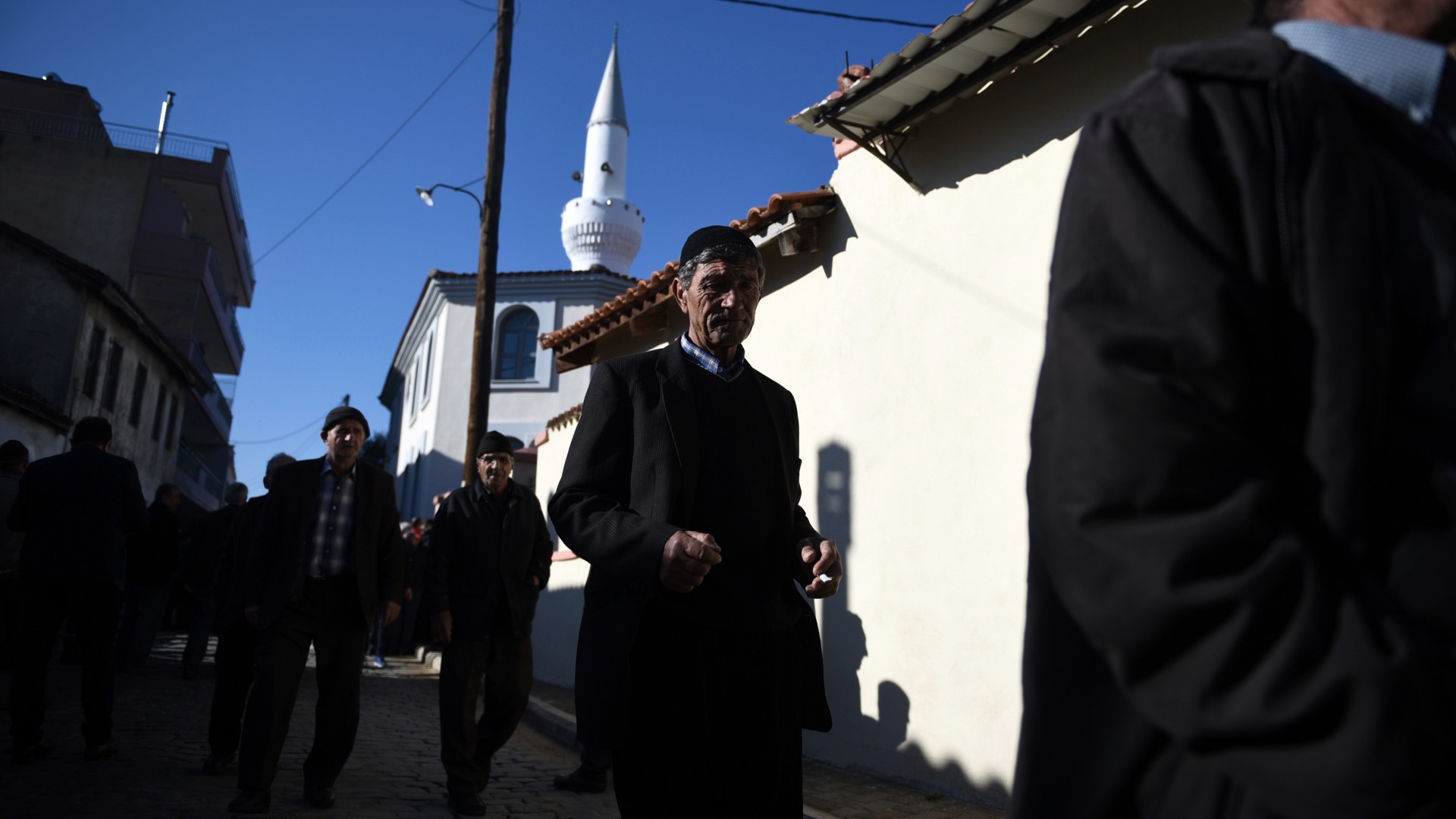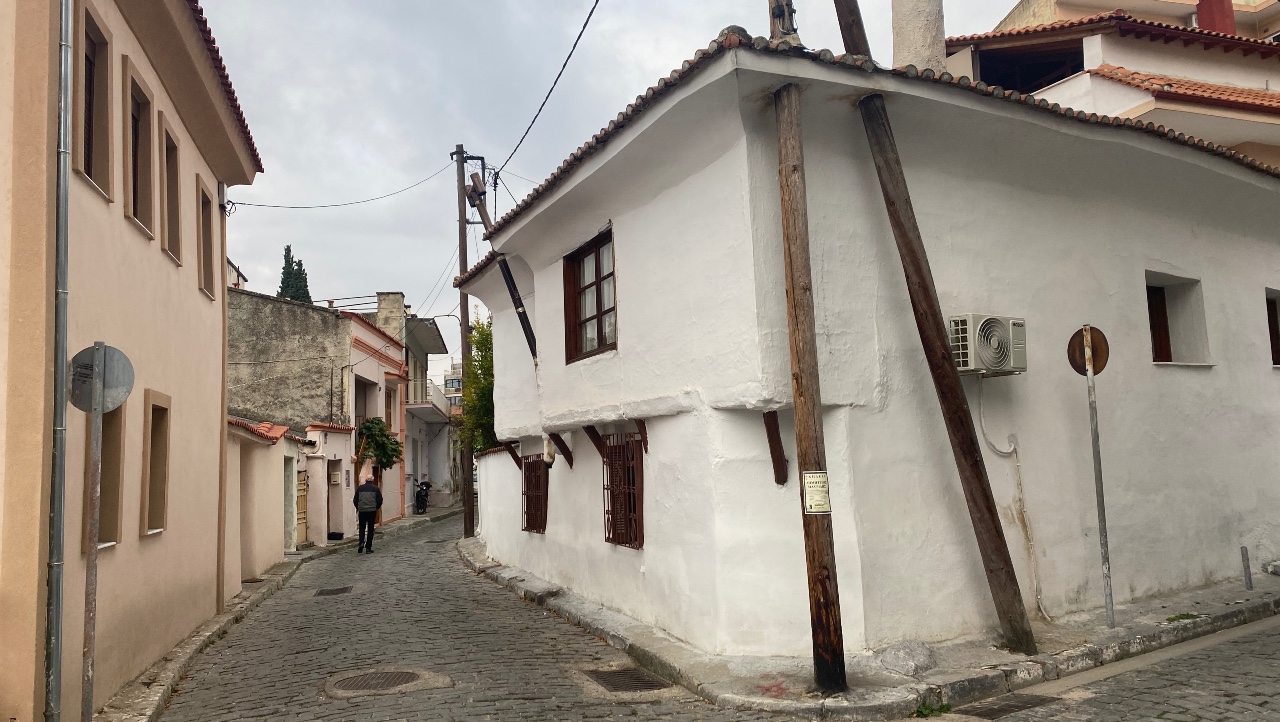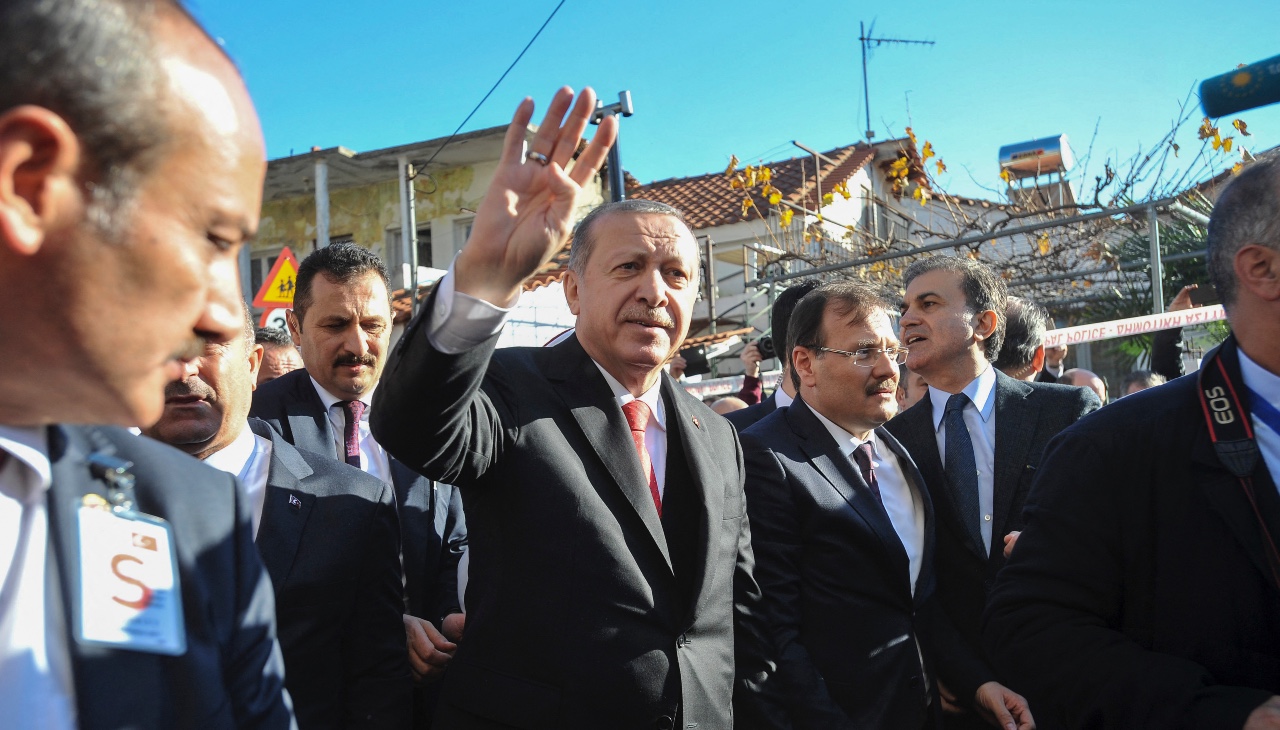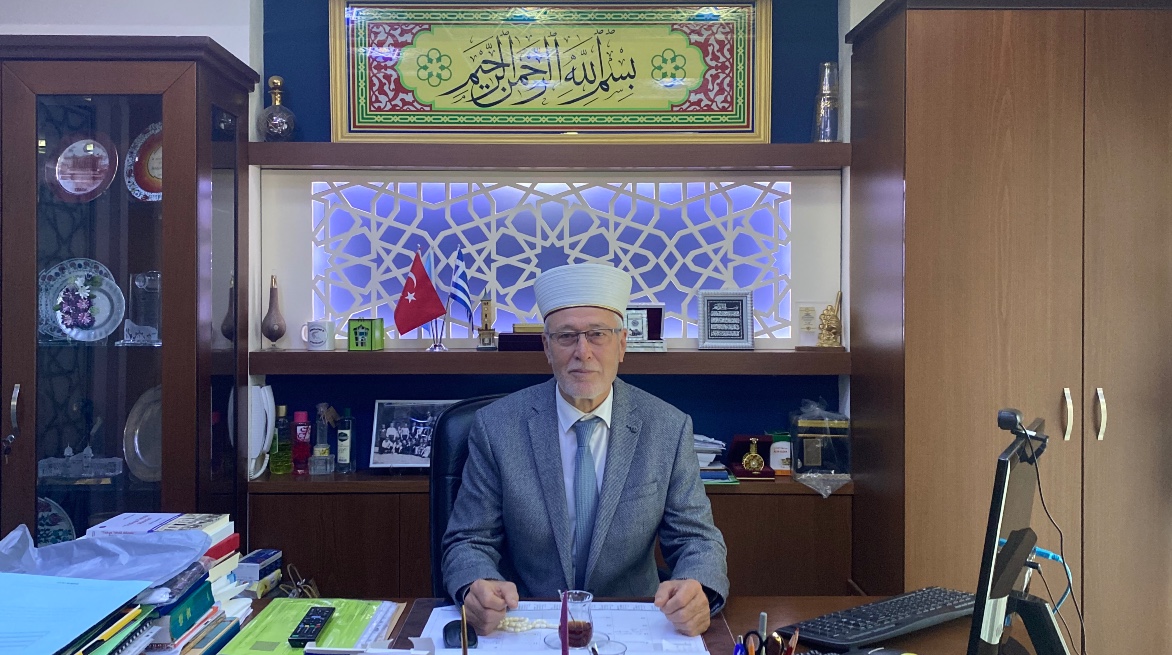
The survivors of Lausanne: Intrigue and rivalry in Western Thrace
It’s a Tuesday night in Komotini. Copious amounts of Vergina beer are flowing at a downtown bar where university students and off-duty Greek soldiers alternate between swigs of the local lager and drags on their cigarettes.
Above the beat of a Greek pop song a group of shabbily dressed young men eye the crowd. “These two are Greek for sure,” Hasan nods at a nearby table. “The group outside is Turkish.”
“You mean Christian and Muslim,” George responds wryly.
In Western Thrace, everyone appears to be a rookie anthropologist, debating the region’s rich past and cosmopolitan present.
The province derives its name from historical Thrace, which today also includes parts of Turkey and southern Bulgaria. For centuries, the area was a trampling ground of empires - Roman, Byzantine, Ottoman - and peoples. It remains a transition zone between east and west.
Stay informed with MEE's newsletters
Sign up to get the latest alerts, insights and analysis, starting with Turkey Unpacked
Komotini, the regional capital, is a hodgepodge of architecture from bygone eras: neoclassical mansions, drab concrete apartments, and old terracotta roofed shops with jutting upper storeys. Turkish and Greek echo throughout Eirinis Square, the city’s gathering point, where locals snack on Bougatsa, a Greek pastry, and Lahmacun, a spicy Anatolian flatbread.
Western Thrace’s diversity is a vestige of the Treaty of Lausanne, which on 30 January 1923 dissolved the Ottoman Empire and mandated a population exchange between Greece and Turkey along the religious lines of the Empire’s millet system: 1.5 million Greek Orthodox Christians were expelled from modern-day Turkey and 400,000 Muslims from Greece.
Yet, the Muslims of Western Thrace, the Greek Orthodox of Istanbul and the islands of Imbros and Tenedos, were exempt from the exchange. Istanbul's Greek Orthodox community were keen to remain in the city where they had long prospered, which is also home to the Patriarchate of Constantinople. In exchange, Turkey won a concession for Muslims to remain along its border in Western Thrace.
In the following decades, the minorities became “mutual hostages” of the rival neighbours, Vemund Aarbakke, an expert on Western Thrace at the Aristotle University of Thessaloniki, told Middle East Eye.
“A unique feature of the Lausanne Treaty was that it codified reciprocal treatment of the minorities,” he said.
Greek Orthodox Christians in Turkey were fiercely persecuted. In 1955, the Greeks of Istanbul were attacked in a state-sponsored pogrom. Most fled or were deported. Their numbers have shrunk from around 120,000 in 1923 to 2,000 today.
The Greek government responded with its own policy of “administrative harassment”. The mainly ethnic Turkish minority was prevented from buying or selling land and couldn’t obtain loans. They faced arbitrary arrest and were denied driver’s licenses.
In the early 1990s, their frustration boiled over into social unrest. Then-prime minister Konstantinos Mitsotakis (the father of Greece’s current leader) lifted the policy and pledged the minority “equality before the law”.
But unlike their Christian Greek counterparts in Turkey, the Muslim minority in Western Thrace is still sizable today - about a third of the region’s 350,000 residents. It remains a flashpoint in the geopolitical competition between Greece and Turkey.
The banter in Hasan and George’s bar reflects the main dispute: what to call the minority. Ankara asserts it is Turkish, while Greece, referencing the 1923 Treaty of Lausanne, and wary of Turkey’s influence on its territory, officially recognises a Muslim minority.
It’s an old tussle between historic foes. But the 100th anniversary of Lausanne comes at a time of heightened Greek-Turkish tensions, just as this strategic, yet impoverished, region sees renewed geopolitical interest, as a military hub and potential energy transit route amid the war in Ukraine.
A 'Trojan horse'
Depending on the passerby, the alleys of Komotini reverberate to the click of Komboloi, Greek worry beads, or the strumming of Tesbih, Turkish prayer beads. Local intrigue is palpable in the city. Mustafa Colakali, a leftist journalist, speaks in hushed tones.
“Hardcore members of MIT are everywhere in Thrace,” he tells MEE, using the acronym for Turkey’s intelligence service.
Colakali claims that Turkish agents once offered him cash to write favourable news coverage of Ankara and its activities in Western Thrace. “I didn’t take it. But I have many journalist friends who did,” he said.
Burak Ozugergin, Turkey’s outgoing ambassador to Greece, denied the allegations. “Trust me, nobody needs to be paid or pressured to be critical of Greece’s treatment of its own citizens living in Western Thrace,” he told MEE.
But Colakali’s claims add to a picture of what academics, local residents, and politicians describe as Turkey’s outsized grip over the minority, that goes beyond the linguistic, cultural, and historical ties that may bind the two.
For many, the gated Turkish consulate in the centre of Komotini epitomises the long arm of Ankara’s foreign policy in this isolated Greek border region.
“The consulate has a big budget to distribute allowances and money to support the minority and organisations. It is a kind of intervention that Greece doesn’t want to have,” Kosta Tsitselikis, a specialist in Balkan studies at the University of Macedonia in Thessaloniki, told MEE.
“The Turkish consulate in Komotini operates like a colonial power,” said Abdul, a prominent member of the minority who spoke using a pseudonym over security concerns. “People are afraid to say one tiny thing of criticism against Turkey or they will have problems. Your friends will forget you. Your neighbours won’t talk to you.”
The headquarters of The Friendship, Equality, and Peace (KIEF) party is located on a leafy street in downtown Komotini. KIEF calls itself "a political party of the Greek state, but in essence… a Turkish party”. Many in Greece see it as a trojan horse of the Turkish government, operating within Greece's political system.
In the party leader Cigdem Asafoglu’s office, Greek and Turkish flags adorn a bare brick wall. “We as a party advocate that this minority is Turkish,” she told MEE. “I am a Turkish politician, Greek citizen.”
'People are afraid to say one tiny thing of criticism against Turkey or they will have problems'
- Abdul, prominent member of Western Thrace minority
Asafoglu said that KIEF’s platform has grassroots support, pointing to strong performances in European parliamentary elections. “The minority overwhelmingly says it is Turkish,” she said.
Others say there is little room for dissent from Ankara’s line.
With his short-cropped white hair and rimless glasses, Ilhan Ahmet looks more like a provincial accountant than a politician from this hardscrabble farming region. He is an MP with Greece’s socialist Pasok party, one of three minority members in the Greek parliament. “It's a fact that members of the minority are more afraid of criticising Turkey than Greece,” Ahmet told MEE.
He is embroiled in a feud with the Turkish consulate. This summer he was ousted from a prominent minority advisory board for being “not one of us, but Greek”, accused of losing “all emotional ties to the minority”.
He believes Turkey uses the minority to stew tensions with Greece.
“I represent everyone from Rodope, minority and majority alike. I think Turkey wants to keep the minority separate. It wants conflict.”
Asked how he identified, Ahmet replied: “I have Turkish origins, but a Greek mind.”
Bizarre hairsplitting
Statistics on the minority are hard to come by. Greece says it consists of three subgroups: 15 percent Roma; 35 percent Pomaks, Slavic Muslims who speak a dialect similar to Bulgarian; and the remaining 50 percent are Greeks of “Turkish descent”.
The Treaty of Lausanne brushed aside questions of ethnicity and language, assigning new national identities based on religion, so that Greek-speaking Muslims and Turkish-speaking Christians were forced out of their homelands.
The minority went from being subjects of an empire to citizens of a nation-state, albeit one they felt little connection to. “At the time of the Lausanne Treaty, the minority was a post-Ottoman community. It was not so Turkish,” Tsitselikis said. “Gradually it became nationalised, acquiring the Turkish national identity."
Many purchased property in Turkey. A largely rural community, those who attended university studied in "the motherland". Today, graduates still receive scholarships across the border and most people get their news from Turkish television.
The Treaty of Lausanne allows minority children to be educated in special schools. In Western Thrace, many children are sent to minority schools, where lessons are in both Greek and Turkish, though the number going to state schools is increasing.
To check Ankara's influence, Athens has been accused of favouring Roma and Pomak ethnic identities over Turkish. Critics say Greece allows associations to register as legal entities that contain the word “Pomak”, but not those with the word “Turkish”, though they operate unofficially. “As adamant Ankara is that the minority is fully Turkish, Greece tries to resist by emphasising the other ethnicities,” Aarbakke from Aristotle University said.
Experts say both Greece and Turkey have promoted organisations and cultural groups in a battle for influence over the minority. “Each one tries to attract persons to their side,” Aarbakke said. “They do that through money and supporting associations.”
The tussle has led to some bizarre hairsplitting.
The Turkish Youth Union of Komotini sits in a peaceful corner of the city. In the morning, old men play backgammon. On weekends, there is traditional folk dancing. The Union occupies a building owned by the Komotini Waqf, a traditional religious trust. The Waqf is viewed by some as aligned with Athens, while the Union is seen as close to Turkey.
“Because the association has no legal status and can't establish a contract, we don’t pay rent,” Sedat Hasan, head of the Union, told MEE.
The battle over registering minority organisations that describe themselves as Turkish has played out in the courts.
In 2021, Greece’s Supreme Court rejected an appeal from the Turkish Union of Xanthi to register on “national security and public order grounds”. The Union cited a European Court of Human Rights ruling that it should be allowed.
Its president Ozan Ahmetoglu said it had a constitutional right to register and defended the inclusion of "Turkish” in the association’s name. "Why is your name important to you?" he asked rhetorically. "Because that is who you are. We are a Turkish minority. Would you like it if I called you another name?”
Ozugergin, Turkey’s ambassador, accused Athens of attacking its citizens’ right to self-identification. “Members of the Turkish minority already feel the burden of being treated as a national security problem by their own state apparatus,” he said.
Evripidis Stylianidis, a local MP from Rodope with the right-wing New Democracy ruling party, dismissed the claims. He said Greece had created "an open European society" in Western Thrace that "celebrated its ethnic and religious diversity", accusing Turkey of seeking to "homogenise" the minority.
“Everyone in Greece has the right to self-identification. People can claim to be whatever they want. This is a personal right for every human being, but not a common right when it implies collective identity with a state,” he said.
Revisionist designs?
Looming behind Greek concerns is the ethnically divided island of Cyprus, said Tsitselikis.
Ankara invaded Cyprus in 1974 in the name of protecting the Turkish minority after a failed coup attempted to unite the island with Greece. Cyprus remains split between the official republic in the south and a government in the north, recognised only by Ankara, where 40,000 Turkish troops are stationed.
In 2017, Turkish President Recep Tayyip Erdogan visited Western Thrace and raised the prospect of changes to the Lausanne Treaty that defines the two countries’ borders and outlines the rights of the Muslim and Christian minorities. The comments sent a shockwave through Greece.
Concerns in Athens that Turkey harbours revisionist designs over its territory have only heightened with Erdogan’s recent rhetoric.
Over the summer, Erdogan made a veiled threat to invade Greece, saying Turkey, “could come suddenly one night”. He has boasted that a missile could hit Athens “unless you stay calm”.
“We have just seen one war erupt in Europe with a country claiming it must protect an ethnic minority,” Anastasios Chatzivasileiou, a New Democracy MP and advisor to Prime Minister Kyriakos Mitsotakis, told MEE, pointing to Russia’s invasion of Ukraine, which Moscow justified in-part on protecting ethnic Russians.
“Well, according to the Lausanne Treaty, the minority in Thrace is a Muslim one, not a Turkish one, as Ankara claims,” he said.
“The Muslim minority should be a bridge between Greece and Turkey,” he added. “Thrace is an example that Christians and Muslims can live together in peace. It should not be part of Turkey's revisionist plans for the Balkans. Greek Muslims are European citizens, proud of their Greek identity."
Enduring traditions
Until recently, Greece was the only non-Muslim country in the world that officially applied Shariah law, a legacy of the Treaty of Lausanne that stipulated that the minority would be able to live under its traditional and Islamic customs. Greek civil courts even deferred matters of divorce, marriage, and inheritance to state-appointed muftis.
In 2018, Greece’s parliament made Shariah optional, giving members of the Muslim minority the ability to take cases to civil court. Today, Shariah only applies if both parties consent to go before an Islamic judge.
Western Thrace is home to 240 mosques, the highest ratio of active mosques per Muslim citizen in Europe. Just like Greek Orthodox priests, state-appointed imams and muftis receive their salary from the Greek government.
Athens says muftis must be appointed by the state - and not directly elected from the minority as Turkey calls for - because they serve as administrators and judges whose decisions are still legally binding.
Besides the state-appointed muftis, Thrace is home to two unofficial ones that are funded by Turkey and elected by the minority. They are not recognised by Greece.
“What we want is religious autonomy,” Ibrahim Serif, Komotini’s Turkish-backed mufti told MEE.
Calls for the direct election of muftis is a sensitive issue. Outside of Komotini a more traditional image of Western Thrace emerges.
The road west to Xanthi, the region's third largest city, passes through small villages where mustachioed men in skullcaps and old women in colorful headscarves appear out of high-walled gardens. The minarets of restored Ottoman-era mosques glisten against the forested Rhodope mountain range on the horizon.
Mufti candidates are shortlisted by an advisory board made up of local members. Greece’s education minister picks from the list.
Mustafa Trampa, the Turkish-backed mufti of Xanthi, sees the process as an attempt to sidestep direct elections and curtail the minority's ties to Turkey.
“Turkey is our kinstate. We are Turks. We are Muslims,” He told MEE. “It’s not possible to maintain our identity without the government of Turkey. Our existence depends on Turkey’s existence."
Breaking out of the rivalry
The swirling mix of languages and cultures in Western Thrace makes the region fertile ground for the rivalry between Greece and Turkey. While the minority is often caught in between, it can also be a participant, with an elite that courts both sides.
“On one hand, these issues aren’t so much problems of the minority, as they are problems of Greece and Turkey,” Aarbakke told MEE. "The elite do not see problems to be solved, so much as things to build a political career on."
Western Thrace is one of the poorest places in the European Union. According to the Greek government, 29 percent of the population here and in neighboring East Macedonia are at risk of poverty. One in three people work in agriculture. The sprawling Thracian plain is carefully segmented by wheat and tobacco fields. Clumps of unpicked cotton drift along the main highway.
“There is still a huge financial gap between the minority and majority,” Colakali, the journalist from Komotini said. “But when it comes to everyday life there is not a big difference."
Thalia Dragona, an expert on Western Thrace at the University of Athens, said that while the minority’s elite are mainly pro-Turkish, a larger segment of society was starting to see itself outside the narrow confines of Athens and Ankara's rivalry.
'I don’t relate to an Athenian guy, but I don’t relate to the guy from Istanbul either. It’s complicated. Fluid'
- Hasan, Komotini resident
"Every day people have other concerns,” said Dragona, who spent years working in Western Thrace on reform of minority education.
A case in point, Dragona said, is the easy mixing of young people at bars and cafes in downtown Komotini, which would have been unthinkable in the past.
“Things have changed immensely," she said. “The younger generation is more liberated. Twenty-five years ago they were a completely separate community."
The shift has been driven by Greece's efforts to integrate the minority after decades of isolation and state harassment, which left many unable to even speak the Greek language.
Today, Athens imposes a quota system in universities mandating at least half a percentage of all seats for minority students and has relaxed Greece's notoriously difficult testing requirements. In 1997, 100 minority students entered Greek universities; by 2018 more than 500 were enrolling each year.
It’s past 11 pm. Despite the rural surroundings, Komotini has a robust nightlife, aided by the city's 16,000 university students. Another round of Vergina beer is flowing at the bar.
Asked how he identified, Hasan paused, then said: “Well, I don’t relate to an Athenian guy, but I don’t relate to the guy from Istanbul either. It’s complicated. Fluid.”
Hunger has replaced the need for drink and talk turns to getting mezze, a delicious mix of dips and dishes that is a confluence of the cultures and peoples from across this region, much like Greece's Thrace.
Middle East Eye delivers independent and unrivalled coverage and analysis of the Middle East, North Africa and beyond. To learn more about republishing this content and the associated fees, please fill out this form. More about MEE can be found here.









